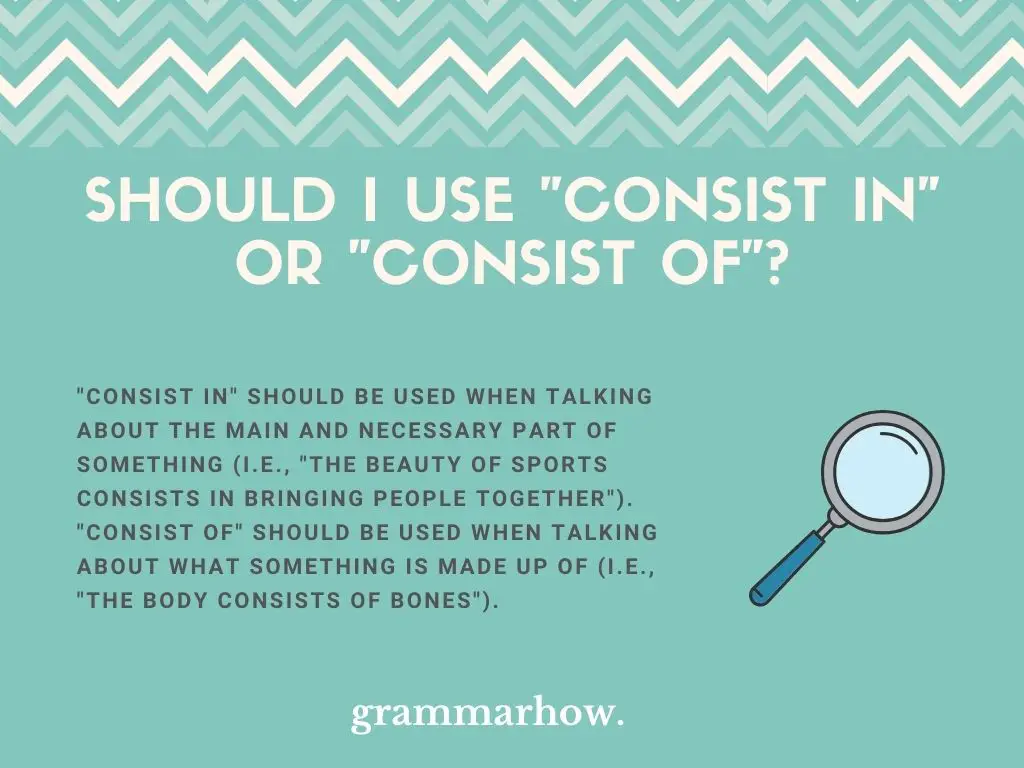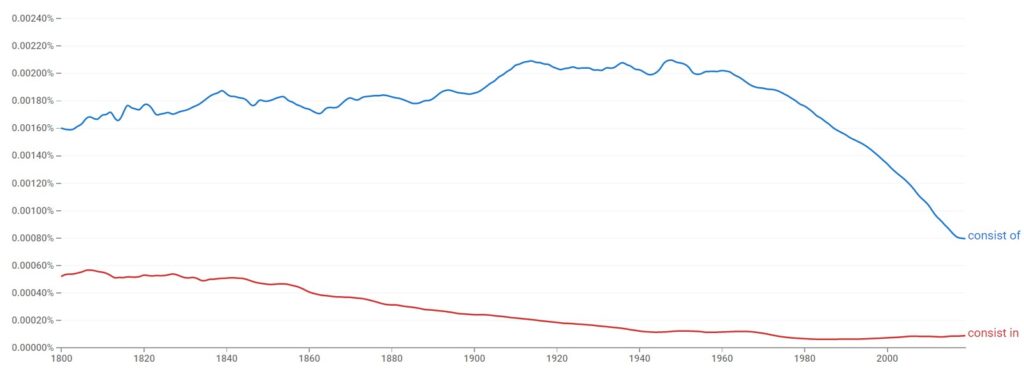Making sure you use the right prepositions after any word is important in English. You might think they’re only small, but prepositions go a long way to changing a meaning. In this article, we’ll look at the difference between using “consist in” and “consist of.”
Should I Use “Consist In” Or “Consist Of”?
“Consist in” should be used when talking about the main and necessary part of something (i.e., “the beauty of sports consists in bringing people together”). “Consist of” should be used when talking about what something is made up of (i.e., “the body consists of bones”).

The meaning of “consist in,” according to The Cambridge Dictionary, is “to have something as a main and necessary part or quality.” That means that it’s the only thing you should focus on when something “consists in.”
The meaning of “consist of,” according to The Cambridge Dictionary, is “to be made of or formed from something.” This means that if something is made up of something else, it is “consisted of” it.
Is “Consist In” Or “Consist Of” Used The Most?
To help us find out which is more commonly used, we thought we’d include a graph to demonstrate the two prepositions.
If you take a look at this graph, you’ll see that “consist of” is by far the most popular choice of the two. It’s because it’s more common that the context will come up where something is made up of another thing rather than the context that works better for “consist in.”

Generally, there are quite a few replacement words and phrases that people would use in place of “consist in.” It’s not a well-known phrase by many native speakers, so they tend to avoid it.
- Her happiness consists in eating candy and chocolate bars.
While this sentence is grammatically correct, it’s not common for someone to use it in this way. Instead, they might use synonymous phrases like “is owed to” or “is because of.”
Should I Use “Consist” Or “Consists”?
When we’re writing the phrase, we’re using the verb “consist.” We have to make sure we’re using the correct verb forms whenever we include a pronoun in a sentence, so let’s look at which ones work best.
“Consist” should be used when you’re talking in the first person singular or plural (I, we), second person singular (you), or third person plural (they). “Consists” should be used when you’re talking in the third person singular (he, she, it).
Other than that, you don’t need to know any other rules. These are the basic verb forms that you have to follow to make sure you get the spelling for “consist” correct.
- I consist of nothing but sugar. I really like sugar.
- They consist of all sorts of stuff; just read the label.
- It consists of dangerous chemicals!
These examples show the two different ways you might use the varying verb forms of “consist.” Make sure you know which pronoun you’re using in the sentence before you write the wrong form.
7 Examples Of How To Use “Consist In” In A Sentence
We find that examples are some of the most useful ways for us to learn about new language rules. That’s why it’s important to check out this section to see how we use “consist in” in a sentence.
“Consist in” is used when we want to talk about something being the entire and necessary part of something.
- The beauty of space consists in learning about the unknown.
- My happiness consists in making sure my family is okay.
- Knowing what these things are consisting in is important to understand them better.
- What would you say your love consists in?
- To me, love consists in finding common ground to enjoy time with my partner.
- Therapy consists in helping patients understand their issues and work through them.
- University consists in practicing a subject until you master it.
As you can see, “consist in” isn’t a common phrase, but we use it when we want to talk about the entirety of something. It’s another way of saying that without this very important thing, then this other thing can’t exist.
7 Examples Of How To Use “Consist Of” In A Sentence
“Consist of” is the more common of the two, so some of these examples may be more familiar to you.
“Consist of” is used when we want to talk about how something is made or what it is formed of.
- The human body consists of over 200 bones.
- The planet we live on consists of almost 200 countries.
- I consist of blood and bones, as all humans do.
- This cereal consists of a lot of dangerous stuff!
- Where does it say what this nutrition bar consists of?
- The school consists of a bunch of boring teachers.
- My family consists of musicians and artists.
We use “consist of” to say that something contains something else. It’s a great way to show what is inside something.
Consist In Or Of – Synonyms
Let’s go through some synonyms and alternatives that’ll help us understand the meanings of each phrase a little bit more.
- Contain
“Contain” is a great synonym to use in place of “consist of.” It means that something is made up of something else.
- Comprise
When something is “comprised” of something else, it means it is formed of that. It’s another great synonym to use instead of “consist of.”
- Be expressed by
We can use this phrase instead of “consist in” when we want to talk about the main points to express something else.
Which Other Prepositions Can Be Used After “Consist”?
Other than the two prepositions we’ve covered throughout this article, there’s only one other preposition we can share with you.
“Consist with” is a potential phrase that we can use. When we use “consist with,” we’re talking about something that is consistent with something else.
- These ideals consist with government guidelines.
- This data consists with the facts.
Other than “consist with,” “consist of” and “consist in” are the only other likely candidates. “Consist of” is still by far the most popular choice of them all, though.

Martin holds a Master’s degree in Finance and International Business. He has six years of experience in professional communication with clients, executives, and colleagues. Furthermore, he has teaching experience from Aarhus University. Martin has been featured as an expert in communication and teaching on Forbes and Shopify. Read more about Martin here.
